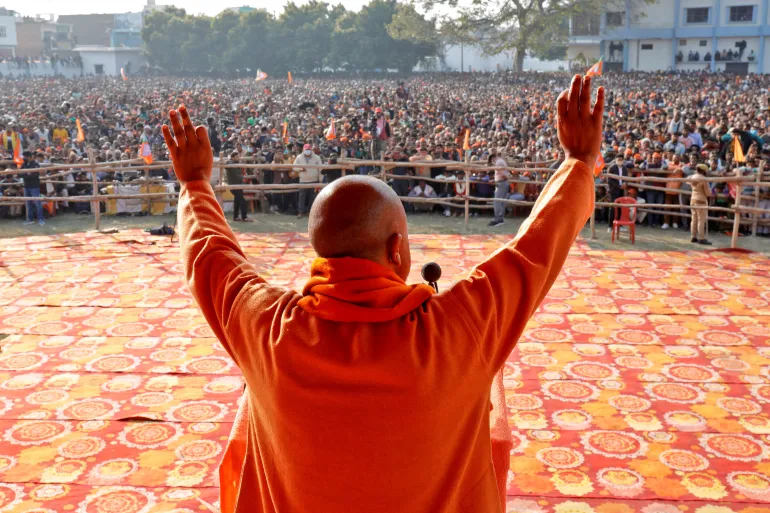Yogi Adityanath: The Political Journey of Uttar Pradesh’s Chief Minister

Table of Contents
ToggleIntroduction
Yogi Adityanath, the Chief Minister of Uttar Pradesh, is a prominent and controversial figure in Indian politics. Known for his strong rhetoric, Hindu nationalist stance, and significant policy initiatives, Adityanath has become a central figure in the governance of India’s most populous state. This article provides an overview of Yogi Adityanath’s background, political career, governance style, and the impact of his leadership on Uttar Pradesh.
Early Life and Background
1. Early Years and Education
Born Ajay Mohan Bisht on June 5, 1972, in Panchur, Uttarakhand, Yogi Adityanath’s early life was marked by a strong inclination towards spirituality and public service. He was raised in a traditional Hindu family and showed an early interest in religious studies and social work.
- Education: Adityanath completed his schooling in Uttarakhand and later pursued a Bachelor’s degree in Mathematics from Hemwati Nandan Bahuguna Garhwal University. His academic background reflects a blend of traditional values and intellectual pursuits.
2. Spiritual Pursuits and Monastic Life
Before entering mainstream politics, Adityanath became a prominent figure in Hindu religious circles. He joined the Gorakhnath Math, a renowned Hindu monastery, and took on the monastic name Yogi Adityanath. His association with the monastery significantly shaped his political and ideological perspectives.
- Gorakhnath Math: Under the guidance of his guru, Adityanath became deeply involved in the activities of the Gorakhnath Math, which played a crucial role in his rise as a political leader.
Political Career
1. Entry into Politics
Yogi Adityanath’s entry into politics was facilitated by his strong association with the Gorakhnath Math and his reputation as a Hindu nationalist leader. He joined the Bharatiya Janata Party (BJP) and contested his first election for the Lok Sabha in 1998.
- Initial Elections: Adityanath was elected as the Member of Parliament (MP) from Gorakhpur constituency, a position he held for several terms. His tenure in Parliament was marked by his focus on issues related to Hindu nationalism and rural development.
2. Rise to Prominence
Adityanath’s rise to prominence was characterized by his vocal advocacy for Hindu causes and his strong leadership style. His tenure as MP and his association with the BJP helped him build a significant political base.
- Key Issues: During his time in Parliament, Adityanath was known for his controversial statements and positions on various issues, including cow protection, religious conversions, and minority rights.
- Party Leadership: His leadership qualities and political acumen were recognized by the BJP, which eventually led to his appointment as the Chief Minister of Uttar Pradesh in March 2017.
Chief Ministerial Tenure
1. Policy Initiatives and Governance
As Chief Minister, Yogi Adityanath has implemented a range of policies aimed at addressing various socio-economic issues in Uttar Pradesh. His governance style has been characterized by a focus on law and order, infrastructure development, and social reforms.
- Law and Order: Adityanath’s administration has been notable for its emphasis on improving law and order in the state. His government has taken a tough stance against crime and corruption, aiming to enhance public safety.
- Infrastructure Development: The Chief Minister has prioritized infrastructure projects, including road construction, urban development, and transportation improvements. Notable initiatives include the construction of expressways and the development of smart cities.
2. Controversial Policies and Criticisms
Yogi Adityanath’s tenure has also been marked by controversies and criticisms. His policies and statements have often sparked debates and raised concerns among various sections of society.
- Hindu Nationalism: Adityanath’s strong Hindu nationalist stance has been a subject of controversy, with critics alleging that his policies and rhetoric promote religious intolerance and discrimination.
- Handling of Social Issues: His approach to handling social issues, including the management of communal tensions and the enforcement of moral policing, has faced criticism from various quarters.
Impact and Legacy
1. Economic and Social Impact
Yogi Adityanath’s leadership has had a significant impact on Uttar Pradesh’s economy and social fabric. His policies have aimed to address developmental challenges and improve the quality of life for residents.
- Economic Growth: Under his leadership, Uttar Pradesh has seen improvements in economic indicators, including increased investment and industrial growth. However, challenges remain in areas such as poverty reduction and employment generation.
- Social Development: The Chief Minister’s focus on education, healthcare, and infrastructure has contributed to social development, though disparities and regional inequalities persist.
2. Political and Electoral Influence
Adityanath’s political influence extends beyond his tenure as Chief Minister. His leadership style and political strategies have had a lasting impact on the BJP and the broader political landscape of India.
- BJP’s Success: Adityanath’s tenure has strengthened the BJP’s position in Uttar Pradesh, contributing to the party’s electoral successes and expanding its influence in the state.
- Future Prospects: His continued prominence in Indian politics suggests that Yogi Adityanath will remain a significant figure in shaping the future of Uttar Pradesh and national politics.
Conclusion
Yogi Adityanath’s journey from a religious leader to the Chief Minister of Uttar Pradesh reflects a complex and dynamic political career. His tenure has been marked by both achievements and controversies, shaping the governance and political landscape of one of India’s largest states. As he continues to navigate the challenges and opportunities of leadership, Yogi Adityanath remains a key figure in Indian politics, with a lasting impact on Uttar Pradesh and beyond.













Post Comment